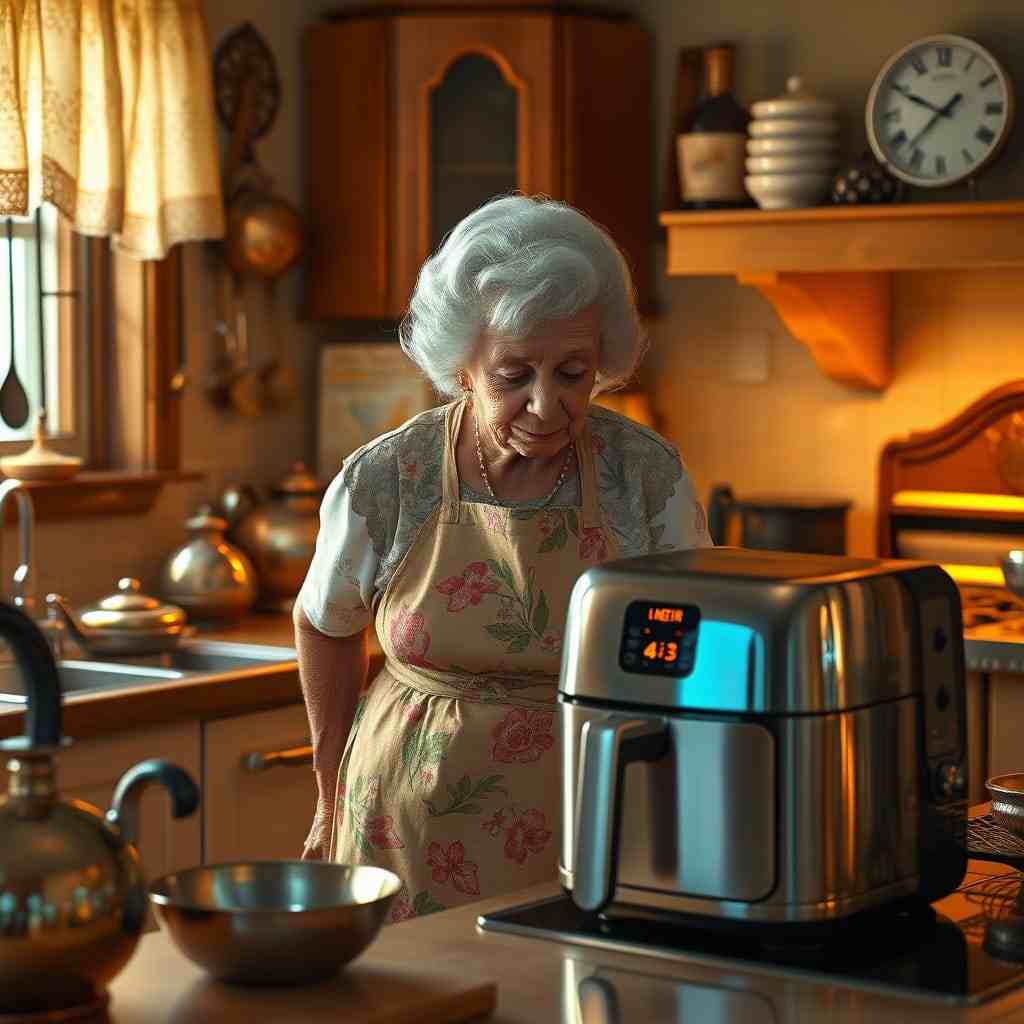Pauline's Air Fryer Blues
Richard

Want to track your favorites? Reopen or create a unique username. No personal details are required!
Pauline's got a gadget but she ain't impressed
Got an air fryer sittin and it gives her no rest
Eighty-five years and she's seen it all
But this contraption's the bane of her hall
Every recipe's a mystery wrapped in smoke
She's got no patience for this modern bloke
Knobs and buttons makin' her feel weak
She misses her stove that's genuine antique
Pauline’s air fryer givin her strife
Stirrin up trouble in her peaceful life
She’s a classic lady in a techy world
Old-fashioned ways make her feel like a girl
Rememberin the days of a trusty old pan
Long before machines made meals so bland
With every beep she rolls her eyes
Wishing for simpler times under the skies
Neighbors rave about this modern might
But Pauline keeps waging her personal fight
She's got no love for this fancy toy
Her fried chicken now brings no joy
Broken recipes and burnt mistakes
Every air fryer meal her heart it breaks
She's a culinary queen from back in the day
Now this gizmo makes her kitchen a fray
Richard's Pauline's Air Fryer Blues
Ah, Pauline’s Air Fryer Blues! A modern tragedy wrapped in culinary misadventure, garnished with a sprinkle of generational disdain for blinking contraptions and their cryptic user manuals. If ever there were a subject fit for wry rumination, this would be it—a tableau of technological betrayal played out in a kitchen whose walls have borne witness to simpler, more honest culinary days.
One imagines Pauline, an octogenarian stalwart, standing imperious before this futuristic interloper, arms akimbo, regarding it not with curiosity but suspicion. For eighty-five years, her kitchen has been her castle, her stove the throne, and her wooden spoon the sceptre of her culinary kingdom. Into this hallowed domain has crept an air fryer, that smug emissary of modern convenience, bearing promises of health and efficiency that it will almost certainly fail to keep.
The opening lines of Pauline’s lament reveal the heart of the matter:
“Pauline’s got a gadget but she ain’t impressed Got an air fryer sittin’ and it gives her no rest”
It’s a tale as old as the Industrial Revolution: the conflict between man and machine, or in this case, woman and whirring appliance. The air fryer, gleaming with its brushed steel veneer, is a Trojan horse of the culinary battlefield. It promises crispy chips with half the oil and chicken thighs cooked to golden perfection in mere minutes. But Pauline, a doyenne of the casserole and custodian of the crackling roast, is not so easily seduced.
“Every recipe’s a mystery wrapped in smoke She’s got no patience for this modern bloke”
Ah, the recipe book—a thin volume of false hope, replete with glossy pictures of unattainable meals and smug captions like “Ready in 15 Minutes!” It’s a cruel taunt to anyone who remembers the joy of cooking being in the simmer and stir, the slow alchemy of flavours melding over hours. To Pauline, these pages are akin to hieroglyphs, their instructions as cryptic as a washing machine’s control panel.
What’s more, the air fryer is a device that beeps. It beeps at you to start, it beeps at you halfway through, and it beeps at you when it’s done. For Pauline, who grew up in a world where food announced its readiness with an aroma, not an alarm, this cacophony is not just unnecessary but borderline offensive.
“Knobs and buttons makin’ her feel weak She misses her stove that’s genuine antique”
Oh, the antique stove! Let us pause to pay homage. It’s a relic from a time when craftsmanship was tangible, when knobs turned with a satisfying click, and the flame was something you could see and trust. Pauline’s stove has likely weathered generations of stews, puddings, and Yorkshire puddings. It has never beeped in its life, and if it did, it would surely apologise for the intrusion.
But now we must confront the central irony of Pauline’s predicament: the neighbours.
“Neighbours rave about this modern might But Pauline keeps waging her personal fight”
Ah, the neighbours! They’re the Greek chorus in this domestic tragedy, heralding the air fryer as the Second Coming of kitchen appliances. They speak of “crispy” this and “hassle-free” that, conveniently omitting tales of undercooked chicken and chips that emerged more soggy than sublime. Pauline’s refusal to bow to the consensus marks her as a culinary rebel, a champion of authenticity in a world smitten with shortcuts.
And what of the meals themselves? The fried chicken, once a dish of triumph, now reduced to a battlefield casualty. Burnt edges, rubbery centres, and a taste that whispers of disappointment.
“Broken recipes and burnt mistakes Every air fryer meal her heart it breaks”
Here, the song reaches its emotional nadir. Pauline’s heartbreak is not merely about taste; it’s about the erosion of ritual. Cooking, for her, is not a means to an end but an act of creation, a dance of fire and flavour that culminates in something greater than the sum of its ingredients. The air fryer, in its ruthless efficiency, strips away the poetry, leaving only the mechanics.
But Pauline is not entirely without humour in this saga. Her eye-rolling at every beep is the very definition of stoic defiance. She’s no Luddite—she probably has a television and possibly even a microwave. It’s not technology she abhors but the idea that it should replace skill and care.
Indeed, her resistance is a reminder that not all progress is progress. For every labour-saving gadget that genuinely improves our lives, there is another that merely complicates it, a wolf in technological sheep’s clothing. Pauline’s air fryer, it seems, is firmly in the latter category.
So, what’s to be done? Should Pauline consign the air fryer to the back of a cupboard, where it will gather dust alongside the juicer and the bread machine? Or should she persevere, perhaps learning to appreciate the gadget for what it is rather than lamenting what it is not?
One imagines her compromising, using the air fryer for what it does well—perhaps reheating leftovers or crisping up a slice of bread—while keeping her antique stove for the real cooking. It’s a solution both pragmatic and poetic, a testament to Pauline’s ability to adapt without surrendering.
In the end, Pauline’s Air Fryer Blues is not just a song; it’s an anthem for anyone who has ever been bamboozled by a gadget, who has ever stared at a blinking light and thought, “Is this progress?” It’s a reminder that while technology may march ever forward, the heart of the kitchen will always be the person in it, armed with a wooden spoon, a pinch of salt, and a generous helping of patience.
This text was generated by AI and is for reference only. Learn more
Want to join the discussion? Reopen or create a unique username to comment. No personal details required!



Comments
No comments yet. Be the first to comment!